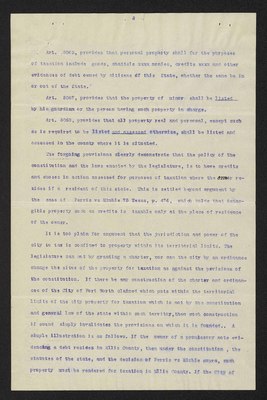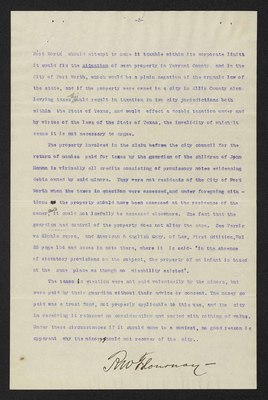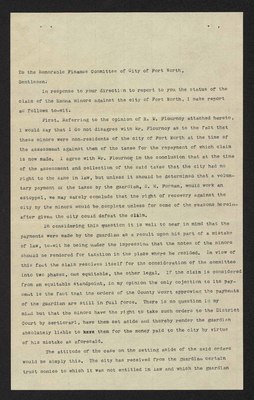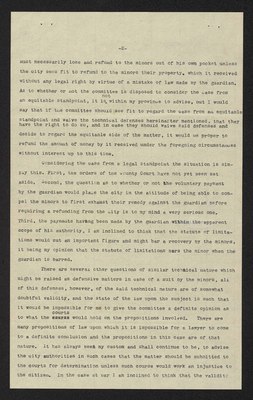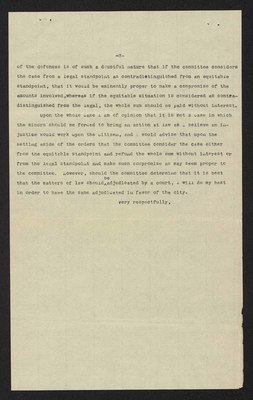Pages
26
2
Art. 5063, provides that personal property shall for the purposes of taxation include goods, chattels xxxx monies, credits xxxx and other evidences of debt owned by citizens of this State, whether the same be in or out of the State.
Art. 5067, provides that the property of minor shall be listed by his guardian or the person having such property in charge.
Art. 5068, provides that all property real and personal, except such as is required to be listed and assessed otherwise, shall be listed and assessed in the county where it is situated.
The forgoing provisions clearly demonstrate that the policy of the constitution and the laws enacted by the legislature, is to have credit s and choses in action assessed for purposes of taxation where the owner resides if a resident of this state. This is settled beyond argument by the case of Ferris vs Kimble 75 Texas, p. 476, which holds that intangible property such as credits is taxable only at the place of residence of the owner.
It is too plain for argument that the jurisdiction and power of the city to tax is confined to property within its territorial limits. The legislature can not by granting a charter, nor can the city by an ordinance change the situs of the property for taxation as against the provisions of the constitution. If there be any construction of the charter and ordinances of the City of Fort Worth claimed which puts within the territorial limits of the city property for taxation which is not by the constitution and general law of the state within such territory,then such construction if sound simply invalidates the provisions on which it is founded.. A simple illustration is as follows. If the owner of a promissory note evidencing a debt resides in Ellis County, then under the constitution , the statutes of the state, and the decision of Ferris vs Kimble supra, such property must be rendered for taxation in Ellis County. If the City of
27
-3-
Fort Worth should attempt to make it taxable within its corporate limits it would fix the situation of such property in Tarrant County and in the city of Fort Worth, which would be a plain negation of the organic law of the state, and if the property were owned in a city in Ellis County also levying taxes this would result in taxation in two city jurisdictions both within the State of Texas, and would effect a double taxation under and by virtue of the laws of the State of Texas, the invalidity of which it seems it is not necessary to argue.
The property involved in the claim before the city council for the return of monies paid for taxes by the guardian of the children of John Hanna is virtually all credits consisting of promissory notes evidencing debts owned by said minors. They were not residents of the City of Fort Worth when the taxes in question were assessed,and under foregoing citations the property should have been assessed at the residence of the owner, and it could not lawfully be assessed elsewhere. The fact that the guardian had control of the property does not alter the case. See Ferris vs Kimble supra, and American & English Ency. of Law, First Edition,Vol 25 page 154 and case in note there, where it is said- "in the absence of statutory provisions on the subject, the property of an infant is taxed at the same place as though no disability existed".
The taxes in question were not paid voluntarily by the minors, but were paid by their guardian without their advice or consent. The money so paid was a trust fund, not properly applicable to this use, and the city in receiving it returned no consideration and parted with nothing of value. Under these circumstances if it should come to a contest, no good reason is apparent why the minors should not recover of the city..
RW Flournoy —
28
To the Honorable Finance Committee of City of Fort Worth, Gentlemen:
In response to your direction to report to you the status of the claim of the Hanna minors against the city of Fort Worth, I make report as follows to-wit:
First. Referring to the opinion of R. W. Flournoy attached hereto, I would say that I do not disagree with Mr. Flournoy as to the fact that these minors were non-residents of the city of Fort Worth at the time of the assessment against them of the taxes for the repayment of which claim is now made. I agree with Mr. Flournoy in the conclusion that at the time of the assessment and collection of the said taxes that the city had no right to the same in law, but unless it should be determined that a voluntary payment of the taxes by the guardian, S. M. Furman, would work an estoppel, we may safely conclude that the right of recovery against the city by the minors would be complete unless for some of the reasons hereinafter given the city could defeat the claim.
In considering this question it is well to bear in mind that the payments were made by the guardian as a result upon his part of a mistake of law, to-wit he being under the impression that the notes of the minors should be rendered for taxation in the place where he resided. In view of this fact the claim resolves itself for the consideration of the committee into two phases, one equitable, the other legal. If the claim is considered from an equitable standpoint, in my opinion the only objection to its payment is the fact that the orders of the County Court approving the payments of the guardian are still in full force. There is no question in my mind but that the minors have the right to take such orders to the District Court by certiorari, have them set aside and thereby render the guardian absolutely liable to have them for the money paid to the city by virtue of his mistake as aforesaid.
The attitude of the case on the setting aside of the said orders would be simply this. The city has received from the guardian certain trust monies to which it was not entitled in law and which the guardian
29
-2-
must necessarily lose and refund to the minors out of his own pocket unless the city sees fit to refund to the minors their property, which it received without any legal right by virtue of a mistake of law made by the guardian. As to whether or not the committee is disposed to consider the case from an equitable standpoint, it is not within my province to advise, but I would say that if the committee should see fit to regard the case from an equitable standpoint and waive the technical defenses hereinafter mentioned, that they have the right to do so, and in case they should waive said defenses and decide to regard the equitable side of the matter, it would be proper to refund the amount of money by it received under the foregoing circumstances without interest up to this time.
Considering the case from a legal standpoint the situation is simply this. First, the orders of the County Court have not yet been set aside. Second, the question as to whether or not the voluntary payment by the guardian would place the city in the attitude of being able to compel the minors to first exhaust their remedy against the guardian before requiring a refunding from the city is to my mind a very serious one. Third, the payments having been made by the guardian within the apparent scope of his authority, I am inclined to think that the statute of limitations would cut an important figure and might bar a recovery by the minors, it being my opinion that the statute of limitations bars the minor when the guardian is barred.
There are several other questions of similar technical nature which might be raised as defensive matters in case of a suit by the minors, all of this defenses, however, of the said technical nature are of somewhat doubtful validity, and the state of the law upon the subject is such that it would be impossible for me to give the committee a definite opinion as to what the courts would hold on the propositions involved. There are many propositions of law upon which it is impossible for a lawyer to come to a definite conclusion and the propositions in this case are of that nature. It has always been my custom and shall continue to be, to advise the city authorities in such cases that the matter should be submitted to the courts for determination unless such course would work an injustice to the citizen. In the case at bar I am inclined to think that the validity
30
-3-
of the defenses is of such a doubtful nature that if the committee considers the case from a legal standpoint as contradistinguished from an equitable standpoint, that it would be eminently proper to make a compromise of the amounts involved,whereas if the equitable situation is considered as contradistinguished from the legal, the whole sum should be paid without interest.
Upon the whole case I am of opinion that it is not a case in which the minors should be forced to bring an action at law as I believe an injustice would work upon the citizen, and I would advise that upon the setting aside of the orders that the committee consider the case either from the equitable standpoint and refund the whole sum without interest or from the legal standpoint and make such compromise as may seem proper to the committee. However, should the committee determine that it is best that the matters of law should be adjudicated by a court, I will do my best in order to have the same adjudicated in favor of the city.
Very respectfully,
